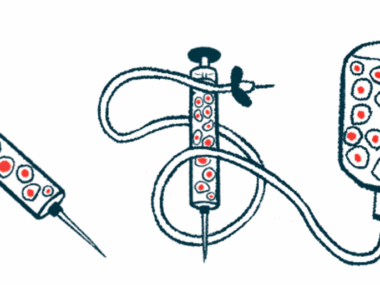First trial group gets commercial formulation of Parkinson’s therapy
Small US study testing Aspen's personalized cell therapy ANPD001
Written by |

In a trial milestone, participants in the third patient group of the ASPIRO Phase 1/2a study (NCT06344026) are now receiving the commercial formulation of ANPD001, Aspen Neuroscience’s cell therapy candidate for Parkinson’s disease.
While participants in earlier groups also received ANPD001, the third group is the only one thus far to receive the formulation Aspen hopes to commercialize if the treatment is approved. The company said this formulation was created with scalable, reliable manufacturing in mind.
“This commercial formulation is designed not just for clinical success, but for real-world impact,” Lisa Johnson-Pratt, MD, executive vice president and therapeutic program lead at Aspen, said in a company press release announcing the dosing of patients in this group, dubbed Cohort 3.
In preclinical studies, this formulation was found to be comparable to that used in earlier portions of the trial, which has been safe and well-tolerated thus far, according to the developer.
“Our vision is to deliver a commercial-ready solution positioned to redefine how neurodegenerative diseases are treated,” Johnson-Pratt added.
Parkinson’s is caused by the death of nerve cells that produce the signaling molecule dopamine. These cells, called dopaminergic neurons, are critical for many brain functions, including controlling voluntary movement and regulating emotional responses. Their progressive loss leads to motor and nonmotor symptoms of Parkinson’s.
Parkinson’s cell therapy formulation designed with manufacturing in mind
ANPD001 aims to replace lost dopaminergic neurons with new ones. It uses an autologous approach, meaning an individual’s own cells are the basis for the treatment. This personalization means that people who receive ANPD001 don’t need to take immunosuppressants to prevent the immune system from rejecting the therapy. Such an approach is expected to reduce infections and other treatment side effects among patients.
To manufacture ANPD001, Aspen uses a proprietary process to convert skin cell samples into induced pluripotent stem cells, or iPSCs. Under the proper conditions, iPSCs can mature into several cell types. For ANPD001, Aspen develops iPSCs into dopaminergic neuron precursor cells (DANPCs).
Surgeons can then inject the DANPCs into the brain using a precision device. This device, which employs an MRI guidance system to ensure accurate delivery, is also proprietary to Aspen. The injection target is a brain region where the cells can potentially develop into functional dopaminergic neurons.
According to Johnson-Pratt, these technologies enable “precision dosing without immunosuppression, ensuring scalable and consistent cell quality, and simplifying surgical workflows.” These techniques are expected to reduce “time and burden on hospital cell processing labs which is critical for commercial viability.”
[This group’s dosing] represents an important step toward commercial readiness. … We’ve optimized our formulation and delivery system to meet the rigorous demands of late-stage development and future market access, while preserving the personalized nature of our [personalized treatment] approach.
ASPIRO is testing the safety and tolerability of ANPD001 when injected at escalating doses in patients ages 50-70. Eligible participants will have responded well to levodopa, a first-line or starting Parkinson’s treatment.
Early results from the first three participants, who received a low dose of ANPD001, demonstrated improvements in motor function, according to the company. Six months after receiving the therapy, participants had an average 45% decrease in motor symptom severity when off medication, and a 71% increase in their ability to perform everyday tasks.
Investigators did not record any serious side effects during that six-month period, and participants didn’t require immunosuppressive treatment, Aspen noted.
The third study group will receive the commercial formulation of ANPD001. With this formulation, clinicians can use frozen DANPCs immediately after they arrive at a treatment institution.
Damien McDevitt, PhD, president and CEO of Aspen, said “Cohort 3 represents an important step toward commercial readiness.”
“We’ve optimized our formulation and delivery system to meet the rigorous demands of late-stage development and future market access, while preserving the personalized nature of our autologous approach,” McDevitt said.
ANPD001 has received fast track designation from the U.S. Food and Drug Administration (FDA). This allows Aspen to interact more frequently with regulators and may accelerate any FDA review of the therapy.



